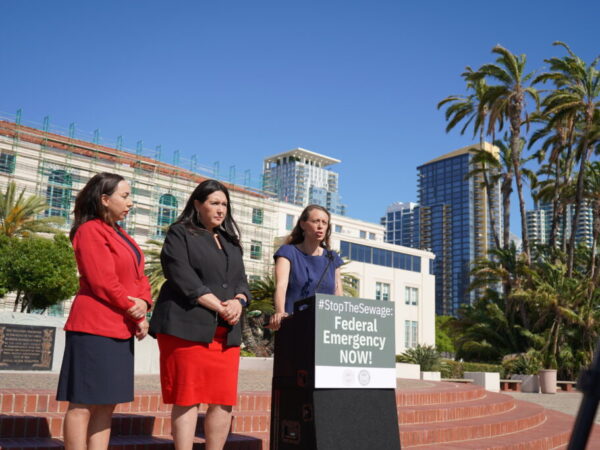
After enduring decades of transborder sewage flow, San Diego County lawmakers are considering an unprecedented move: declaring a local state of emergency.
If approved by the county board of supervisors next week, the declaration would push the matter upward, giving first the state and then the federal governments the chance to issue their own emergency declarations.
“We’re calling for a federal emergency to make sure the projects to stop the sewage are funded and implemented as quickly as possible,” said Terra Lawson-Remer, vice chair of the San Diego County Board of Supervisors. “We cannot spend years waiting for these fixes to be made. We need action now.”
Lawson-Remer is championing the board policy with Chairwoman Nora Vargas. The two announced their move alongside Imperial Beach Mayor Paloma Aguirre, a vocal advocate for stopping the sewage, at a press conference Tuesday.
Although a potential state of emergency is new, the problems at the border are not: untreated sewage has been spilling into coastal waters for decades. The goal, Vargas said, is that by enacting a state of emergency, the matter will be more visible and therefore more swiftly addressed.
“The Tijuana River Valley extends beyond environmental justice,” Vargas said, “because it impacts our public health. The Tijuana River pollution directly impacts our families, our businesses, and our beaches.”
The proposed emergency declaration would also trigger an investigation into the economic impacts the sewage crisis has caused south county, to be completed within 120 days. It’s widely accepted that beach closures affect tourism and commerce in coastal communities, but there is little data describing its full economic impact.
The federal government has allocated $300 million to addressing infrastructure issues at the border, and Mexico has budgeted an additional $144, but this money does not fund all the projects needed to solve the issue, and repairs are trudging forward.
The lawmakers hope that the emergency state would expedite repairs and entice Mexico to complete more projects on the other side of the border.
“This will put pressure on the Mexican government to do their part,” Lawson-Remer said. “A federal emergency lets Mexico know that the Punta Bandera (wastewater) treatment plant must be fixed. It’s not just a San Diego issue; it’s a major, national priority of the United States.”
Aguirre has already appealed directly to President Joe Biden’s administration to issue an emergency declaration, but starting with a county-level state of emergency may yield better results, said Spencer Katz, communications manager for the Lawson-Remer.
“If you go straight to the federal level, that limits what the federal state of emergency can do for you, monetarily,” he said. “If you go through the steps of county, then state, then federal, the options are much more robust.”
A few days prior to the press conference, Lawson-Remer introduced a public petition in support of the state of emergency policy. It garnered more than 900 signatures over the course of several days, Katz said.
Both Vargas and Lawson-Remer assumed office in January 2021, and were elected as chair and vice chairs of the board of supervisors in January 2022.
“We’ve never had the political will, frankly, at the county to take this step,” Lawson-Remer said. “It represents a change in orientation and leadership.”
The board of supervisors will vote on the potential emergency declaration at its June 27 meeting. Public comment is accepted in person, over the phone, and through online submissions.




